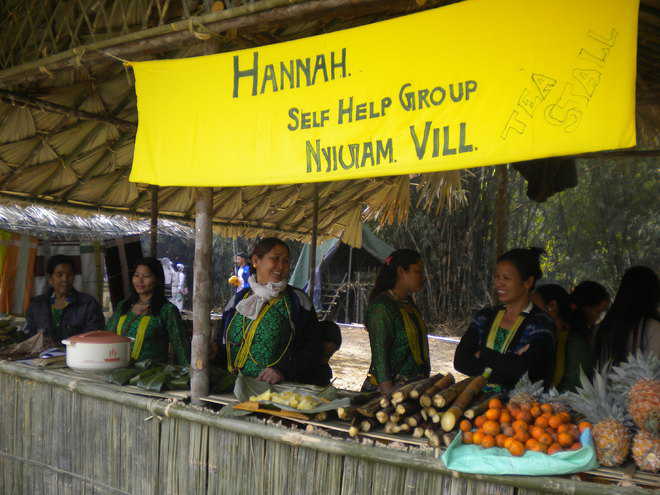
Woman power: A stall at BasCon 2017, an event held to celebrate the state's first artist residency programme, by a women's only cooperative that deals in organic farming
Abhilasha Ojha
It’s a rough ride to Basar, a quaint hill town in the west Siang district of Arunachal Pradesh. Though awarded the status of a town, Basar, to city-bred people, will still seem like a village — with all the nature's bounty, flora and fauna, in abundance.
Given our hectic and fast-paced lives, there's no denying that Basar's fresh air and fabulous natural surroundings are a treat to the eyes. From the Dibrugarh airport, we reach Bogeebil ghat to catch the ferry to cross the mighty Brahmaputra. But its majestic beauty is marred by numerous floating plastic bottles, empty chips packets, plastic cups and other waste floating in the river.
The river does boast of a bridge, the Bogeebil Bridge, albeit an unfinished one. It has been under construction for the past 18 years! However, once finished, it will reduce the one-hour ferry time to barely 10 minutes. It will be India's largest rail-road link on the Assam-Arunachal Pradesh border. It will open a lifeline between the plains of upper Assam and the mountainous northern Arunachal Pradesh, bordering China.
From the ferry, Silapathar (roughly a 30-minute drive), a town in Dhemaji district in Assam, is the point from where the journey to Basar really begins. It is home to the Galo tribe, which worships Mother Nature by celebrating the Mopin harvest festival, regarded as one of the most important events for the Basar folk. The festival, in fact, is a throwback to the centuries-old belief of these people, descendents of Abu Tani, the mythical forefather of this tribe, to pray for a good harvest.
The census town is full of lush-green forests. While we rest inside a nakum, a wooden hut that doubles up as a rest house for farmers, it's interesting to learn about ethnic foods eaten in a typical Galo household. There's apong, the local rice beer, which everyone consumes in gallons, on a daily basis. Along with this beer, Galo women make rice cakes, fish curries, meat and many green vegetables. Boiled rice cakes, wrapped in leaves and boiled tapioca are some of the snacks that are consumed every day. There's also poka, a traditional rice wine, which jazzes up the socio-cultural life of this tribal town.
The traditional food eaten in Basar is intimately connected to the Galo tribe's socio-cultural, ecological, spiritual life and health. The processing and preparation of various ethnic foods by Galo tribeswomen demonstrate how they turn to the ecosystem to sustain and nourish them. Dishes made of local products — soybean, bamboo shoot, tree bean, laipatta (leafy mustard) and rai, are some interesting dishes that should genuinely be explored by connoisseurs and food experts.
One hears mystical stories of the spirits and deities residing in the forests of this hill town even as priests and shamans preside over rituals and sacrifices to invoke the spirits of the forests to protect them and ward off evil spirits. The air of Basar is always thick with the echoes of shamanic chants. During a traditional, community fish catching ceremony, when there's a near-fatal accident of a middle-aged man drowning, the community blames it on the absence certain rituals that should have been held prior to the fish catching exercise. "This cave," says one villager ominously, "has a spirit that caught this man." Later, this person fills us in with stories of youngsters gone missing in forests ("caught by the spirits never to come back") or those who came back but never remained the same ("the spirit lives on in them and we have to periodically offer prayers and sacrifices to appease the gods"). We hear stories of mithun sacrifice, a lovely, gentle-looking animal, that has to be sacrificed and fed to nearby villages during weddings ("the more mithuns you sacrifice, the more wealthy you are considered," explains another villager). Though several of these customs may be tough to relate to, the locals believe it is for the betterment of the community.
Basar is true to this spirit of community living; a treat to the eyes of any city-bred person where isolation and loneliness prevails despite all the glitz, glamour and wealth.


























